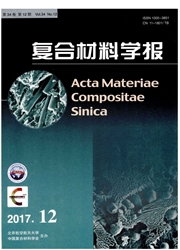

 中文摘要:
中文摘要:
研究了质子注入对二硫化钼/聚芳醚砜(MoS2/PES—C)复合材料摩擦学行为的影响,并用红外光谱和X射线光电子能谱研究了质子注入引起的复合材料结构变化。结果表明,质子注入导致MoS2/PES—C复合材料中基体PES—C的部分降解,并最终在复合材料表面层形成一种富碳结构,质子注入过程中填料MoS2没有发生明显的化学变化。摩擦磨损实验表明,质子注入能够提高其耐磨性,尤其剂量达到1.25×10^16ions/cm^2时,其摩擦系数和磨损率同时降低。磨损机理分析表明,质子注入后复合材料的磨损机理从未注入质子的粘着磨损和塑性变形转变为疲劳磨损。
 英文摘要:
英文摘要:
The effects of proton implantation on the tribological behavior of MoSe/PES-C composites were studied. The structural changes of the composites caused by the proton implantation were studied by using infrared spectra and X-ray photoelectron spectroscopy (XPS). The results show that part of PES-C degrades after proton implantation, and a carbon-rich structure forms on the surface of the composites, whereas there are no obvious chemical changes for MoS2 during the implantation process. The friction and wear tests reveal that the wear-resist ance of the composites could be improved by proton implantation. Especially when the dose reaches 1.25× 10^16 ions/cm^2 , its friction coefficient and wear rate decrease simultaneously. The wear mechanism changes from adhesive wear and plastic deformation for the un-implanted composites to fatigue wear for the implanted ones.
 同期刊论文项目
同期刊论文项目
 同项目期刊论文
同项目期刊论文
 期刊信息
期刊信息
